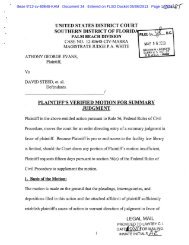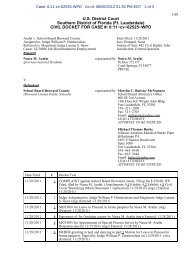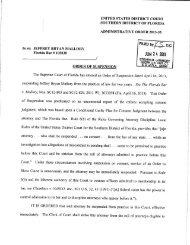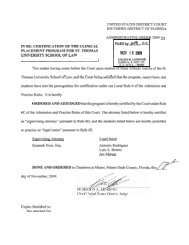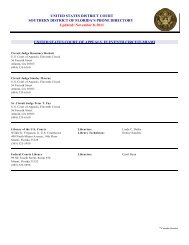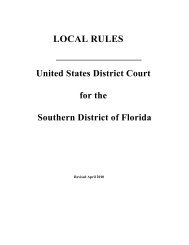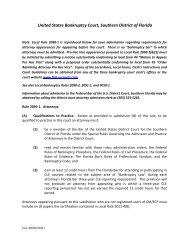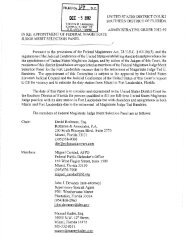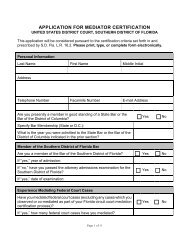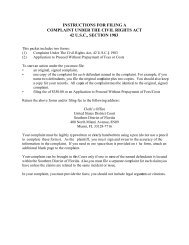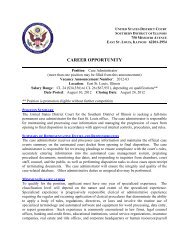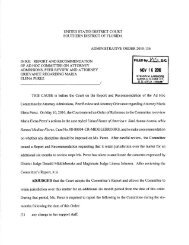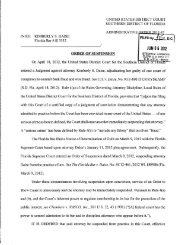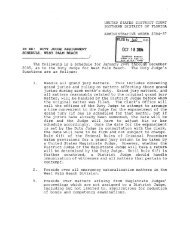JAN j 6 2010 - United States District Court
JAN j 6 2010 - United States District Court
JAN j 6 2010 - United States District Court
You also want an ePaper? Increase the reach of your titles
YUMPU automatically turns print PDFs into web optimized ePapers that Google loves.
Local Admiralty Rule E(2) . This section is new. The rules do not require an<br />
intervening plaintiff to undertake the formal steps required to issue the<br />
original process of arrest or attachment pursuant to Local Admiralty Rule B(3)<br />
or C(2); rather the Committee believes that intervening parties need only<br />
apply for supplemental process, which in accordance with the August 1, 1985,<br />
amendments to Supplemental Rule B and C, may be issued by the Clerk of the<br />
<strong>Court</strong> without further order of the <strong>Court</strong>. The Committee recommends the<br />
re-arrest or re-attachment provisions of this rule in order to accommodate the<br />
administrative and records keeping requirements of the Marshal's Office.<br />
The revision also reflects the elimination of the initial security deposit<br />
formerly required by Local Admiralty Rule 5(e). The Marshal shall, however,<br />
assess custodial costs against the intervening plaintiff in accordance with<br />
Local Admiralty Rule E(5)(b).<br />
Local Admiralty Rule E(3). This section continues the provisions of former<br />
Local Rule 7(e).<br />
Local Admiralty Rule E(4). This section continues the provisions of former<br />
Local Rule 6.<br />
Local Admiralty Rule E(5). The Marshal, as an officer of the <strong>Court</strong> whose fiscal<br />
affairs are regulated by statute and order, is precluded by law from expending<br />
funds of the <strong>United</strong> <strong>States</strong> to maintain custody of vessels or other property<br />
pursuant to claims being asserted by the several states, any foreign<br />
sovereigns, or any private parties. This prohibition extends to incurring<br />
obligations which, if not satisfied, otherwise might be asserted as a claim<br />
against the <strong>United</strong> <strong>States</strong>. Consequently, before undertaking to arrest or<br />
attach property, the Marshal must receive funds in advance of incurring such<br />
obligations sufficient to satisfy them.<br />
Past experience indicates that not infrequently vessels or other properties<br />
arrested for nonpayment of incurred obligations will be ultimately sold for<br />
satisfaction, to the extent possible, of pending claims. In such cases,<br />
substitute security is never given, and the property must be retained in<br />
custody for a sufficient period of time to permit the <strong>Court</strong> to determine the<br />
status of the situation and to order appropriate procedures. In such<br />
instances, custodial costs tend to be substantial and, by the very nature of<br />
the circumstances, the claimants and potential claimants can be both large in<br />
number and will vary markedly in the amounts of their respective individual<br />
claims. Apportioning the obligation to make advances against custodial costs<br />
over this range of claims and claimants has resulted in frequent calls for<br />
judicial intervention.<br />
It was the Committee's view that a system initially self-executing and<br />
ministerial would minimize situations calling for judicial intervention while<br />
affording the Marshal the protection of assured and certain procedures. At the<br />
same time, the Committee was strongly of the opinion that the rules should do<br />
substantial equity as between claims showing wide variation in amounts and<br />
potential priorities and, at the same time, should be so structured as to<br />
require all potential claimants to come forward and share in the cost of<br />
custody, discouraging the sometime practice of claimants' waiting to intervene<br />
until the last moment in order to allow other parties to bear the burdens of<br />
making such advances.<br />
132



